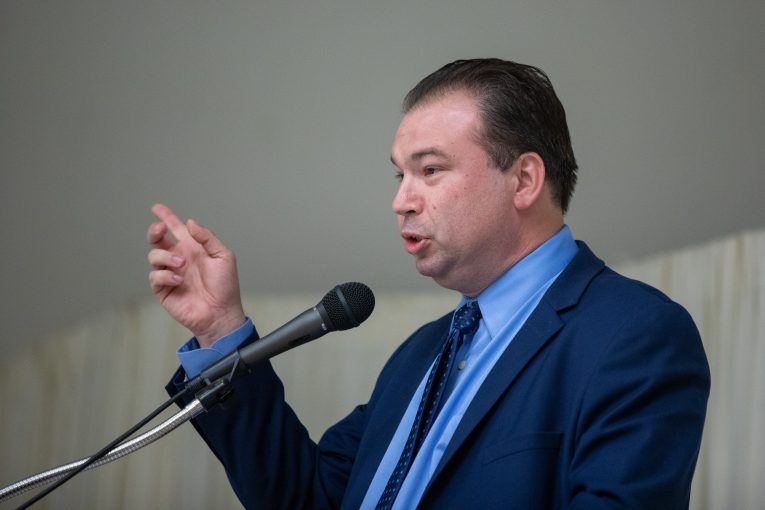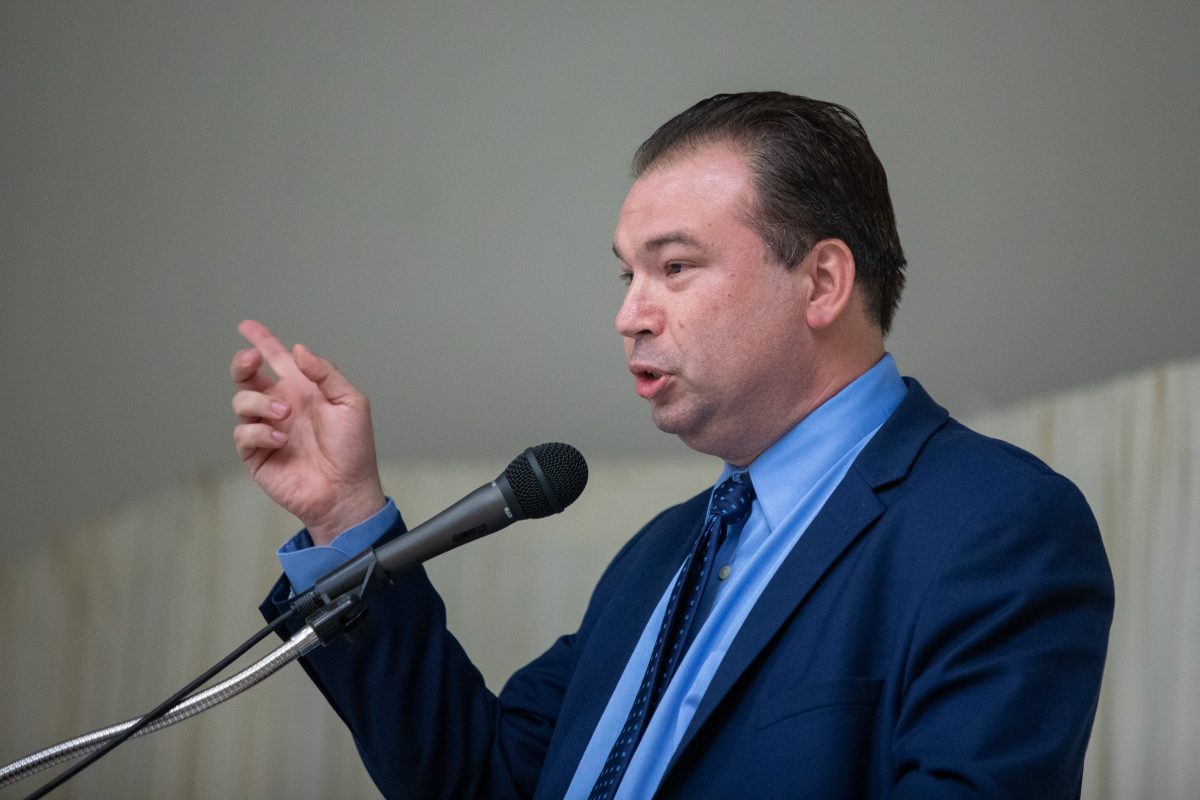

By Jeffrey Deskovic
The Defense Introduces Alibi Witnesses
“Looking back” will feature reprints of articles that Jeff previously wrote while a columnist at The Westchester Guardian, which encompasses topics that are applicable here in CA as well as across the country and not simply applicable to NY.
The defense team, picking up where it left off in week 3, continued to embroider Selwyn Days’ alibi defense around Magistrate McIver’s re-enacted testimony. That testimony had placed their client and his mother Stella Days in Goldsboro, North Carolina, on the 21st of November 1996, when they came to McIver’s office so that his mother could file a complaint against Selwyn’s girlfriend for allegedly making a verbal threat against her the day before. That testimony, by implication, placed both of them in North Carolina the day before; other testimony by the Judge, to wit, “Selwyn was in and out of my office all month,” at times “every day, every other week,” suggested he was there the rest of the month as well.
The defense called Captain Perry Sharpe, a retired homicide detective, who had served in various police capacities for 30 years in Goldsboro. The defense elicited from him that he saw Days and his mother on November 20, when she first attempted to press charges against the same individual for trespassing in her house. Sharpe had told her that it was not a crime since she had been in the house with Selwyn’s permission. She then attempted to have her arrested for making a verbal threat, but Sharpe had counseled her that sometimes people say things they don’t mean when angry and that the alleged verbal threat was not worth prosecuting. He then left, and later learned, despite his counsel, that Stella had gone to the magistrate later that day to get a warrant issued.
A member of the defense team had also asked Sharpe whether Selwyn Days “appeared nervous to talk to a police officer,” with the clear implication being that a person who had recently committed a double murder would be nervous upon being unexpectedly approached by a police officer, to which Sharpe answered, “No.” Asked if Days had any cuts or bruises, he again responded, “No.”
ADA Christine O’Connor, on cross-examination, first established that Stella and Selwyn were both known to him, and then asked “did Stella Days consider you to be her ‘personal police officer’”, to which he smiled and said, “Yes, I suppose so.” With this line of questioning, O’Connor was transparently attempting to suggest to the jury that his familiarity with her was causing him to do her a favor by providing false testimony.
On re-direct examination, however, the defense immediately rehabilitated their witness asking, “Would you lie for Stella or Selwyn?” He quickly snapped, “Of course not.” Defense quickly followed with, “Would you remember things that didn’t happen for Stella or Selwyn?” Sharpe then blared, “Of course not!”
The defense next called Cyndi Burris, the girl against whom Stella had brought charges. Burris, disputing that she had verbally threatened Stella, nevertheless stated that she had started dating Selwyn between October and November of 1996, and that he was living in Goldsboro, North Carolina, at that time. She maintained that she had “either seen Selwyn in person or talked to him on the phone every day in November,” and that “he always called from the number of the landline in the house.” Burris went on to also state the house number was the only number she ever reached him on.
ADA Perry Perrone cross-examined Burris very aggressively. First attacking her credibility, he focused on her previous criminal record, indicating she had been convicted of larceny and felony forgery in connection with passing bad checks, as well as conspiracy to commit arson, for which she did a year in jail. Perrone went on to establish that she had filed for bankruptcy three times, and had 28 civil judgments against her, and suggested that she did not talk to Days every day as she testified. He asked her whether one of her court appearances in connection with the bankruptcy had taken her far from her house, rendering her unable to make or take a phone call from Selwyn. Burris responded that she did not have to be present at all of the hearings and that her lawyer appeared on her behalf.
Perrone then elicited from her that Stella Days had offered her money, “life-changing money,” if she would sign an affidavit stating that she had lived at the house with Selwyn during November. Burris indicated she had refused, declaring “I never lived there. I simply visited him there.” Perrone, however, persisted, asking her, “You refused to sign the affidavit several times, and in fact never signed an affidavit stating that you were living in the house?” She repeatedly answered, “No.”
Perrone then confronted her with court records indicating that her earlier referenced arson case was not over in October, in an attempt to demonstrate that she was not at liberty in November. Burris clarified that what she had meant to say was she was referring to hearings in connection with the arson case, and not its conclusion. She further stated that her memory was not solely tied to this, and that it was also tied to the warrant being taken out against her on the 21st.
The defense called Mr. Evans, who owned two different restaurants in North Carolina. Examined by Defense Attorney Roberto Finzi, he stated that he purchased furniture from Stella Days, at which time he saw Selwyn, on November 15, that he returned to pick the furniture up on the 19th, and that Selwyn helped him load the furniture into the truck. His memory was assisted by reviewing his planning book from 1996.
ADA O’Connor, on cross-examination, asked him, “Who was the first one to ask you to remember 1996?” to which he replied, “Stella.” She followed up by asking him, “Haven’t people been asking you for years to find your planning book?” He answered, “Yes.” Suggesting that he was too close to the Days family to be objective, she asked him, “Did you help her pay for a mortgage?” “At one time,” was his response.
Mark Moore was called to the stand and testified that he signed a lease with an option to purchase a house in New York from Stella Days on October 1, 1996. This tied into Days’ confession, in which he stated that after committing the murders he went back home, whereas by then Stella had leased the home to which Selwyn had referred to Moore.
Cross-examined by O’Connor, he testified that he never slept there at night and that he never changed the locks. She further asked, “He returned to the house after you took control of the house, is that one of the many reasons you threw your hands up?” referring to his walking away from the deal. To which he replied, “Yes.” He stated that he never saw Days return to the house, but that his worker saw him once.
Dr. Jessica Pearson was called to the stand and stated that Days fell below 95% of the population with respect to cognitive functioning. She further stated he was experiencing psychiatric impairment when he was questioned by police, due to his having not received his medication during the many hours of interrogation. She stated “no” when asked by defense attorneys, “Was he able to make a knowing, willing, and voluntary waiver of his rights?” She also mentioned various tests that she had administered, including those designed to catch malingering. Her results matched those of other experts who had testified for the defense at prior trials.
Analysis
Not one of Selwyn Days’ alibi witnesses was without flaw. The Judge didn’t have an exact anchor for each and every day Selwyn was in her office back in November of 1996 except for the day the complaint was filed. Beyond her memory of the 21st, her recollections of November were imprecise. The homicide detective and the restaurant owner were admittedly too friendly with Stella, and Burris had an extensive criminal record.
Yet Burris, despite her continuing financial problems, didn’t take the money reportedly offered by Stella when it would have been most helpful for her to have done so. How likely is it that a homicide detective would be willing to help someone get away with a double murder? Helping someone temporarily with a mortgage is a far cry from committing perjury to provide a false alibi in a homicide case.
Furthermore, when taken in the aggregate, can they all collectively be disbelieved? In this reporter’s opinion, the answer is no.
It is clear from medical records that Days was in no mental shape to fully understand the waiving of his rights, implicating himself falsely. And as this reporter has previously noted, too many elements of his statement were false to be believed.
“Jeffrey Deskovic, Esq, MA, is an internationally recognized wrongful conviction expert and founder of The Jeffrey Deskovic Foundation for Justice, which has freed 9 wrongfully convicted people and helped pass 3 laws aimed at preventing wrongful conviction. Jeff is an advisory board member of It Could Happen To You, which has chapters in CA, NY, and PA. He serves on the Global Advisory Council for Restorative Justice International, and is a sometimes co-host and co-producer of the show, “360 Degrees of Success.” Jeff was exonerated after 16 years in prison-from age 17-32- before DNA exonerated him and identified the actual perpetrator. A short documentary about his life is entitled “Conviction“, and episode 1 of his story in Virtual Reality is called, “Once Upon A Time In Peekskill“. Jeff has a Masters Degree from the John Jay College of Criminal Justice, with his thesis written on wrongful conviction causes and reforms needed to address them, and a law degree from the Elisabeth Haub School of Law at Pace University. Jeff is now a practicing attorney.
